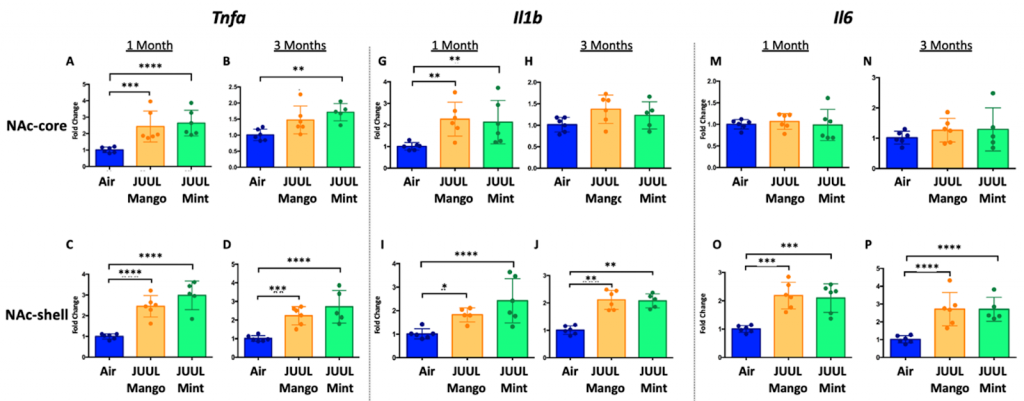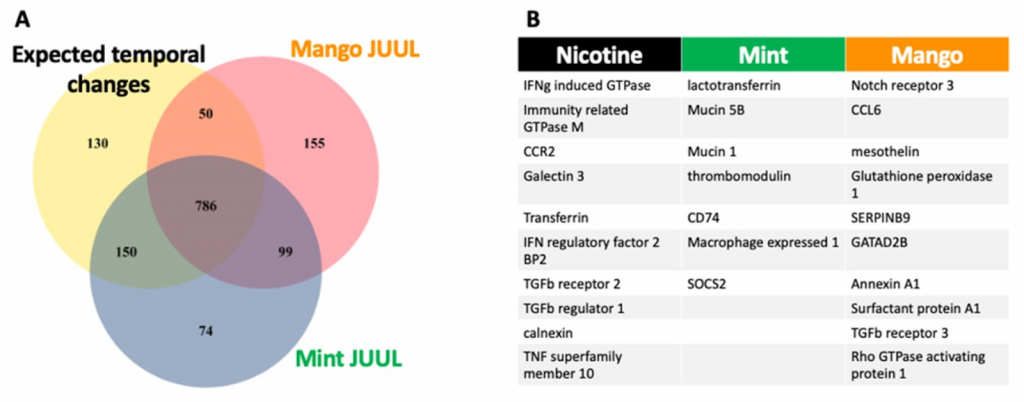Key Points:
- Mice exposed to JUUL aerosols displayed evidence of brain inflammation (neuroinflammation).
- Mice with pulmonary (lung) injury exhibit cardiac inflammation following JUUL exposure.
- The inflammatory profile in response to JUUL aerosols is different between Mint and Mango flavorants.
Although current data is clear on the detrimental effects of long-term exposure to tobacco smoke, scientists have yet to elucidate the long-term effects of e-cigarettes — electronic devices that deliver nicotine to simulate a cigarette — and how they drive the progression of cigarette smoking-related diseases like cancer and heart disease. The challenge has been that e-cigarettes were introduced only two decades ago, leaving scientists with a short window of opportunity to investigate the consequences of long-term exposure. And while many smokers tout that e-cigarettes are healthier than conventional tobacco cigarettes, this claim cannot be substantiated until the proper research has been done.
“These pod-based e-cigarettes have only become popular in the last five or so years, so we don’t know much about their long-term effects on health,” states Dr. Laura Crotty Alexander, senior author of the study, in a press release.
Reported in the journal eLife, UC San Diego researchers evaluate the inflammatory state of multiple organs (brain, heart, lungs) in mice following exposure to Mint and Mango flavored JUUL aerosols three times daily for three months. Alexander and colleagues show that exposing mice to Mint and Mango JUUL aerosols leads to inflammation in a brain region linked to addiction – the nucleus accumbens. What’s more, investigators found that JUUL exposure increases cardiac inflammation in response to lung injury. Interestingly, researchers noticed differences between the effects of Mint and Mango JUUL aerosols, which contain the same amount of nicotine, on the lung and heart, suggesting that chemical flavorants within JUUL aerosols also likely contribute to cardiac and brain inflammation. Taken together, these findings shed light on the potential long-term effects of modern e-cigarettes on organ health.
JUUL Aerosols Induce Brain and Heart Inflammation
Given that neuroinflammation has been tied to chronic use of conventional tobacco, Alexander and colleagues tested if JUUL aerosols elicit the same inflammatory effects in brain regions linked to reward and addictive behaviors (nucleus accumbens) as well as learning and memory (hippocampus). To do so, the investigators placed mice in an enclosed chamber and filled the chamber with JUUL aerosols or air (control). They then looked at the gene activity of inflammatory molecules linked to immune cell function (cytokines and chemokines).
Although the hippocampus of JUUL-exposed mice displayed gene activity similar to control mice, the nucleus accumbens exhibited increased gene activity for inflammation after one and three months of exposure, indicating that short and long term exposure to JUUL aerosols potentially leads to neuroinflammation. Notably, current evidence suggests that neuroinflammation contributes to anxiety and depression, harmful symptoms that can piggyback off nicotine addiction and trap users in a mental downward spiral. With this in mind, further research is needed to uncover the long-term effects of mental health in e-cigarette users.

Current evidence suggests that chronic smoking increases the severity of respiratory diseases. Thus, the UC San Diego researchers analyzed the effects of JUUL aerosols in the lungs of mice following acute lung injury. Surprisingly, after looking at inflammatory gene activity in the lungs of injured mice following three-month JUUL exposure, investigators noted minimal differences between JUUL-exposed mice and control mice, highlighting the possibility that long-term JUUL usage may not affect inflammatory responses to lung infections.
Be that as it may, when Alexander and colleagues conducted the same experiments in cardiac tissue following acute lung injury, JUUL exposed mice presented greater inflammatory gene activity than control mice, indicating that JUUL aerosols may trigger elevated cardiac sensitivity in models of respiratory infection. Moreover, this finding supports previous research that confirms how long-term smoking leads to increased risk of cardiovascular disease and poorer outcomes following pulmonary injury, such as pneumonia.
JUUL Aerosol Flavor Matters
Both the Mint and Mango JUUL aerosols used in this study contained the same amount of nicotine (59 mg/ml). Nevertheless, Mint-flavored pods appeared to induce the highest activity of inflammatory genes in the brain as well as the heart in exposed mice following acute pulmonary injury. What this suggests is that the tantalizing chemical flavorings contained within JUUL aerosols likely play a role in the observed effects of e-cigarettes. However, additional studies are needed to differentiate the inflammatory effects of nicotine and non-nicotine JUUL ingredients.
“This shows us that the flavor chemicals themselves are also causing pathological changes. If someone who frequently uses menthol-flavored JUUL e-cigarettes was infected with COVID-19, it’s possible their body would respond differently to infection,” concluded Dr. Laura Cotty Alexander in a press release.

When Will We Know The Long-Term Effects Of E-Cigarettes?
If you didn’t already know, cigarettes used to be marketed as a healthy habit, with cigarette packages even including dentist ads and images of children smoking. Unfortunately, this facade carried on until enough deceased bodies were examined to determine the long-term deleterious effects of chronic smoking. Currently, many cigarette smokers have transitioned to only smoking e-cigarettes, which could be a healthier form of nicotine delivery than conventional smoking. However, e-cigarettes, like JUUL pods, contain the same amount of nicotine as a full pack of cigarettes and nicotine itself can lead to attention, learning, and memory deficits in adolescents. Adolescents who smoke e-cigarettes are also more likely to become lifetime smokers. While nicotine can have beneficial cognitive effects for older individuals, the toxic chemicals contained within cigarettes and e-cigarettes may outweigh these benefits. With minimal research at our disposal, it’s too early to paint a clear picture of the harmful long-term effects of nicotine vaping devices. Nevertheless, what we do know may suggest that e-cigarette usage could lead to decreased life expectancy, which is on average 10 years less in smokers than non-smokers.